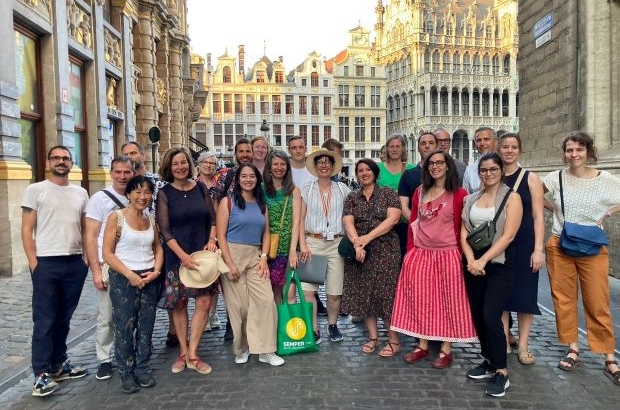- Daily & Weekly newsletters
- Buy & download The Bulletin
- Comment on our articles
CVO Semper: Learning languages is all about living them
Learning a language is much more than grammar and vocabulary, according to Nico Puype, cluster director of business, language, ICT, photography, fashion and cooking courses at CVO Semper. The long-established school is keen to share its philosophy about life-long learning, opportunities for studying abroad and advice on achieving fluency.
What are the strengths of CVO Semper?
First of all, CVO Semper does not only run language courses. We offer photography, cooking, fashion and electronics among other subjects. Languages covered are not just Dutch, French and English; we also provide courses in German, Italian, Spanish, Greek, Russian, Polish, Arabic and sign language.
Our language courses are high quality for a low price, given by experienced and qualified teachers. We teach to different levels of proficiency, beginner or advanced. Professional courses include French for medical purposes and DFPs (Diplômes de Français Professionnel, which is in high demand in Brussels.
We also give shorter thematic courses focusing on pronunciation. There are daytime, evening and Saturday classes, online and offline, so we can meet a lot of students’ needs. The school offers a lot of courses in Dutch, French and English – the lingua franca in the international context of multilingual Brussels. Dutch courses are free from level 1 to level 6; these courses are subsidised by the Flemish government.
Why did you decide to expand your language offer and other activities?
CVO Semper has been offering European languages, mainly Dutch, French and English for more than 50 years. After the merger of four former adult education centres – in Brussels (VUB university), Vilvoorde, Strombeek and Meise, we are teaching in more than 40 locations in Brussels and Flanders. We have 350 staff members and 10,000 students.
The merger allowed us to extend our range of courses. We want to reach a diverse target audience: people who want to follow courses for personal or professional reasons, to integrate in society, enter education or start a profession.
Does CVO Semper offer activities outside the classroom and trips abroad?
For us, learning a language is so much more than grammar and vocabulary. You have to live a language, not just learn it. Learning to express it correctly remains a must, but that alone is not enough. To make the learning experience more enriching, we take students to theatres and exhibitions and bring writers to our schools to present their books. We run study breaks of a few days to France, Germany and Italy for example and day trips in Belgium.
In our school Tandem project, we match students with different target languages. For example, a French native speaker learning Dutch will be paired up with a Dutch student learning French. We also take part in Erasmus projects with a partner school in Tenerife, organising student exchanges.
Finally, we offer other courses, for example Information Communication Technology (ICT) or photography in Dutch. This allows you to have more practice as well as contact with native speakers.
Is it best to learn one language at a time, and what’s the ideal study time?
Focusing on one language can be more manageable and efficient as you can fully concentrate on it to help achieve a higher level. Other people may find it stimulating and enjoyable to learn languages simultaneously, but it could cause confusion if the grammar and vocabulary are similar.
As for the ideal study time, it depends on the student’s goals and schedule, but regular and consistent practice is more effective than sporadic sessions. I would suggest two to four times a week, then you can maintain a steady learning pace and build up your knowledge. It is also better to have shorter study sessions throughout the week than one very long study session.
You can supplement these lessons and sessions with immersion activities like podcasts and conversations with native speakers. Learning a language is a long-term endeavour that requires consistent effort and immersion. The more time that you invest, the faster you will progress.
What are the future challenges for language learning?
First of all, there’s technological advancements including artificial intelligence and the language processing tool ChatGPT. Will this change language learning? We have to keep up with these trends and offer innovative solutions.
We need to meet the changing demands of our students and business clients. People are looking for shorter courses and our ‘at home’ courses are also very popular. We started these during corona and found people like them and want to continue studying in this way.


















